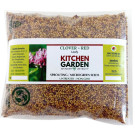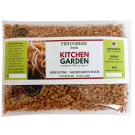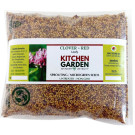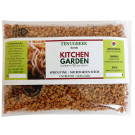-
Description
-
Do you have a question?
Key nutrients in Apricot Kernel:
- Amygdalin (a natural form of B17): Helps to target & kill cancer cells without damaging the immune system.
- vitamin C: Keeps the immune system strong & healthy.
- Vitamin E: Promotes a clear, healthy complexion.
- Calcium: Builds strong bones & teeth.
- Iron: Promotes red blood cell formation & combats anaemia.
Kitchen Garden seeds are:
- Non-GM
- Certified organic
- Highly nutritious
- Easy to sprout
By sprouting your Apricot Kernel, you’ll be increasing their nutritional value, making them easier to digest and neutralising the enzyme inhibitors that would otherwise get in the way of your body absorbing maximum nutrients with each serving.
Suitable for sprouting and general consumption.
Warning!
We urge you to do some of your own research on the potential toxicity of Apricot Kernel. There is a substantial body of conflicting research that has arisen with the rise in belief of Apricot Kernel potentially being a natural cancer cure due to the B17 they contain and there are many food safety bodies that warn that the kernels could be deadly to a toddler at the very least and very toxic to an adult. At present there are not any trials that have been conducted to verify the claims one way or another.
The contention arises because some Apricot Kernel are rich in a bound molecule called, 'Amygdalin'. This molecule contains one part dietary cyanide. The contention is around what our body does with this substance. Those that do not believe there is an issue with amygdalin believe that our bodies naturally convert cyanide to another substance called, 'Thiocyanate'. Sickle cell anemia is a thiocyanate deficiency disease. This seems to indicate that cyanide forms part of our dietary evolution and our bodies have evolved to expect cyanide in our diets. Also, most non-cancerous cells contain another enzyme, rhodanese. Free cyanide molecules are bound to sulphur molecules by rhodanese, creating harmless cyanates that are eliminated in the urine.
So on the one hand the argument is made that we don’t usually suffer from the effects of eating the many cyanide containing foods in our diet because, for instance, we don’t eat fruit pips, usually discard them, or if we eat them, our bodies mostly don’t digest them and we pass them out. Generations ago we used to crush the seeds of plums, cherries, apples and Apricot with our home made jams and preserves and when cooked or fermented, Apricot Kernel toxicity is reduced.
BUT on the other hand, many scientists believe the cyanide does not only harm cancerous tumours but also our bodies, in particular our stomach lining which can even be fatal.
The European Food Safety Authority (Efsa) warns that a single small kernel would be toxic to a toddler. Just three small or one large Apricot Kernel in a single serving could put an adult over safe levels of the poisonous compound. However, its researchers found that even low doses can give unpleasant reactions, and as little as 0.5mg to 3.5mg per kilogram of body weight can be lethal. The organisation issued new advice that no more than 20mg per kilogram of body weight should be consumed at a sitting, which in practice for many people is likely to mean limiting consumption to no more than one raw kernel. For young children, half a kernel would be over the limit.
The American Herbal Products Association has given Apricot seed a class 3 rating, meaning that any products containing Apricot seed should have the following labelling: To be used only under the supervision of an expert qualified in the appropriate use of this substance. Apricot seed also is not recommended for use by children.
A spokesman for the food watchdog FSA said the kernels were a niche product in the UK, but added: "There have been reports from overseas of consumption of 20 to 30 kernels by adults in a short period of time being associated with very serious health effects. They could potentially be lethal in high enough doses."
It's very important we monitor how our bodies react to new substances and quantities. As is the case with most substances we ingest, consumption should be measured and balanced. If the body tells us, through adverse reaction, that we've given it too much of something, it's only sensible to make an adjustment to the quantity. Be in tune with your body and listen to what it has to say.
Our tolerance for amygdalin increases as the body comes to expect it in increasing quantities. It's important to start at small quantities, building up gradually over the days and weeks to follow. Maximum capacities will vary from person to person.
Please Note: This product consists of the sprouting seeds only; sprouting jars & stand are not included. You will need a full standard sprouting kit to grow your seeds.
- Add 3-4Tbsp of your dry seeds to a clean sprouting jar; enough to lightly cover the bottom of an upright jar.
- Cover the sprouting jar with the mesh screen & secure it with a rubber band.
- Cover your dry seeds with 2-4cm water & soak for 6-8 hours or overnight.
- Drain & rinse in fresh water, swirling gently while draining to disperse the seeds across the surface of the sprouting jar. Place the jar at an angle on your sprouting stand.
- Keep your sprouting jar in natural light but never in direct sunlight. Rinse your seeds 2-3 times a day in cool water. The water should be rinsed clear.
- Harvest within 2-3 days of the “tails” and/or greenery appearing from the seeds.
- Drain the sprouts well & leave 2-4 hours to dry on your sprouting stand, before transferring to an airtight, covered storage container.
- Enjoy your sprouts in 3-7 days; keep them refrigerated in an airtight container. Start sprouting new seeds every 2- 3 days for a continuous, fresh supply.
Top Tips:
- Never eat sprouts that have started to smell bad.
- Always wash your containers thoroughly between plantings.
- Remove any broken or damaged seeds before you start sprouting.
- Double rinsing is recommended for beans & legumes.
- Never eat sprouted soy beans with brown spots.
- Unsprouted seeds should be stored in an airtight container in a cupboard. The germination life of seeds is generally 2-5 years.
-
Reviews
-
Reviews
7 out of 8 people would recommend this product
10/02/2025, By TeyWe previously bought from Makro and we were looking for good quality kernels - due to their cancer killing properties. Thus it needed to be great! And to say I was impressed to be able to pay half the price I was currently paying for the same quantity AND the quality being better?! YES PLEASE. We will defs be purchasing our monthly stock from FtN - It was my first order with FtN and it was super quick. They kee you updated all the way! Nothing better than a reassuring and transparent company who is set on making the world a better place02/05/2023, By BettinaI have used apricot kernels for myself and my dogs for years and highly recommend them. I chop them and add to my granola and yoghurt mix.11/05/2020, By AdlaiThese are great but I love them, but unfortunately the price is too high and in my opinion unreasonable and doesn't make sense. that is why I cannot give this a five star27/06/2017, By BrendaEnjoyed spouting the kernels and they tasted so fresh. Would recommend to anyone looking for an alternative to normal sprouts.
Please Note:
Faithful to Nature is an online retail store, specialising in a wide selection of natural supplements, vitamins, superfoods and health-related products. Our green team is all about helping you unlock your full potential to live a healthy life; however we are not medical professionals. Please do consult your health care practitioner when seeking medical advice. Some products may be manufactured in a factory that also produce gluten, nuts and dairy products.







